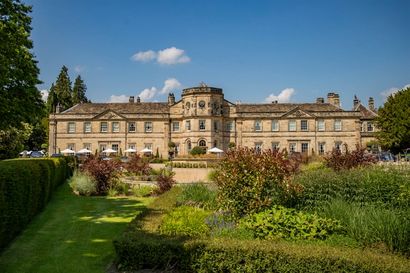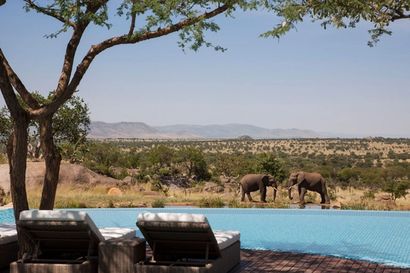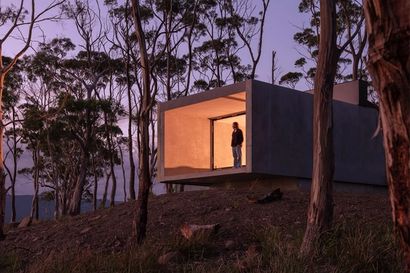The falconer ties a dead quail to the end of a length of rope. With one hand, he unfurls the lure and slings it over his shoulder. On his other arm sits a Peregrine falcon. The bird can’t smell the meat, but as soon as the leather hood covering its black marble eyes is lifted, it explodes from the falconer’s fist and away into the air. The hunt is on.
This is the Arabian Desert, somewhere between the borders of Saudi Arabia and Oman. I find myself sitting on the land of Sheikh Ahmed bin Saeed Al Maktoum, a keen falconer who has dedicated this desert camp – furnished with intricate carpets and well-worn cushions – to the flying of his treasured birds.
The Peregrine reappears from over a distant dune. The falconer, twirling the lure about his body in elaborate sweeps, swerves as the bird swoops for the quail. Snatching its prey out of reach, the falconer repeats this three or four times, before hurling the meat skywards. The falcon grabs the quail, slams into the sand, and begins ripping feathers from the meat with its barbed beak.
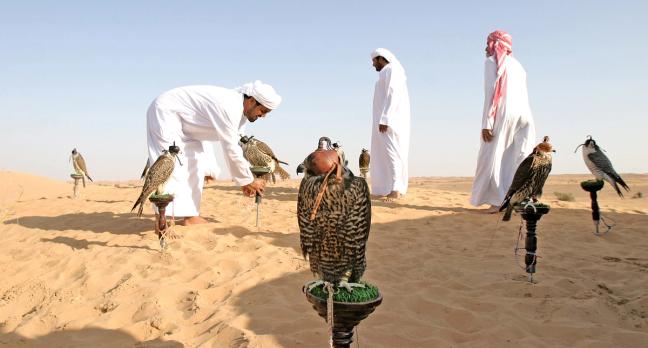
Falconry, in the Middle East, is a practice reinvented. When these traditional Bedouin camps were first established across the vast Arabian Peninsula, raptors were used to hunt live prey. ‘Borrowed’ from nature, the birds were trapped and trained for several months, and then released back into the wild before the breeding season. Today, hunting is outlawed across many of the Gulf States, and the birds – rather than being borrowed from nature – are hefty investments.
But, even as the $10,000 raptor sits on the sand before me, tearing at the sinewy meat of the quail, he is unaware of his species’ impact across the Middle East. For, from their cultural importance and high perch in history, to their role in illegal practices and black market dealings, falcons in this corner of the world have not only a feathered, but a chequered past.
The falcon grabs the quail, slams into the sand, and begins ripping feathers from the meat with its barbed beak
‘They are not affectionate animals,’ says Samir Hajjar, over a meal of camel meat and minted spinach parcels. A Syrian, Hajjar works for Platinum Desert Safari (where prices start from £338 for a wildlife drive through the Dubai Desert Conservation Reserve in a luxurious Range Rover, Falconry demonstration and a 6-course dinner). He explains that falcons are not typical ‘pets’.
‘From UAE to Morocco, people own these birds. And hunting was banned across this part of the desert in 1975 by Sheikh Zayed. So it’s really become less practical now, and more of a power thing. And that’s coincided with the growing wealth of the Middle East.
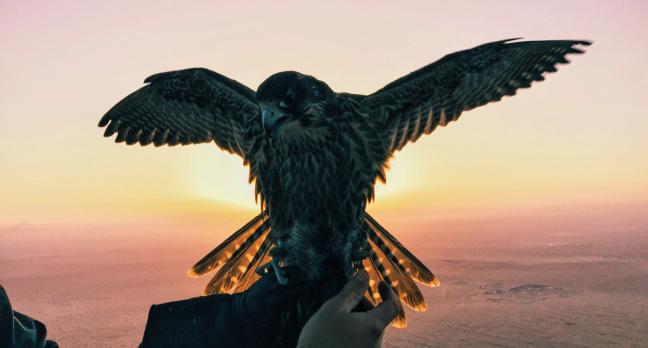
‘So today, for those who have the time – and money – to invest in falconry, there is no greater status symbol.’
Indeed, as we cross the desert on camelback, few of the other creatures we encounter – Arabian oryx, horned vipers and desert foxes to name but a few – are spoken about with such reverence. In fact, Samir tells me, there are countries across the Gulf where people feel as if the rights of falcons are put before even their own.
‘In UAE,’ says the guide, ‘even if you live there all your life, you cannot get citizenship without proper Emirati heritage. But falcons are given passports with no question.’
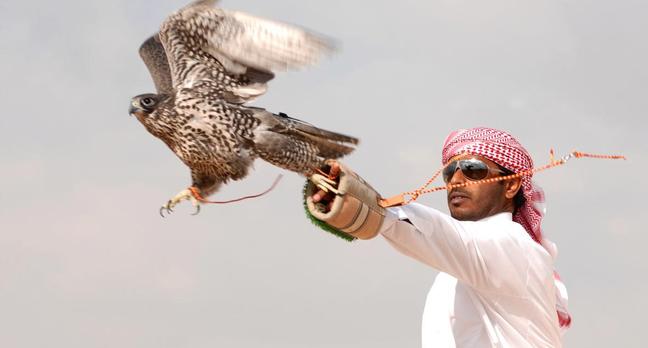
Just this January, a Saudi Prince bought out almost an entire passenger plane to fly his falcons to a part of the country where hunting was legal, and every bird had to show its passport to make it to their individually-assigned seat – most of which were business or first class. On my Emirates flight several days before (Return tickets for Heathrow to Dubai: £675 for Economy Class £2,935 for Business Class and £4,109 for First Class) even though no falcons were on-board, they still featured heavily in the cultural documentaries being shown – where I first heard of the passports. But, although they may sound like novelties, these passports are issued for a serious reason; to combat the smuggling of the birds, and separate the legitimate falconers from those operating illegally.
Sheikh Ahmed bin Saeed Al Maktoum, who owns this land and welcomes guests of Platinum Heritage safaris, is one of the legitimate falconers. But even on the legal side of falconry, there is much money. As our camels reach the top of a dune, Samir points at the Sheikh’s ranch, a building dwarfed by three vast mesh enclosures beside it, like circus tents made from chain link.
‘They are cages,’ says the Syrian. ‘Big cages. The Sheikh will keep his falcons here in winter when temperatures drop. Their home is bigger than his,’ he laughs.
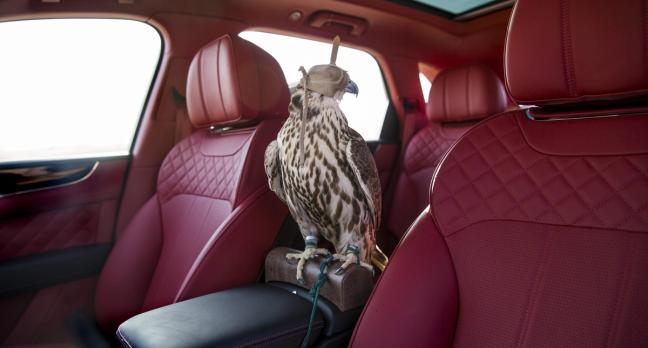
The falcons of the Middle East live lives of luxury. Even disregarding the initial cost of the individual birds – some of which can fetch up to $500,000 – the wider falconry industry has grown exponentially since its humble Bedouin beginnings. Breeding programs span the globe – with most supplying to the Middle East. Wealthy owners organise falcon ‘beauty contests’ – with categories including ‘thickest ankles’ and ‘most golden tint’, and dedicated falcon hospitals across the Gulf States offer x-rays, eye tests and even perform cosmetic surgery on the birds.
Falconry, in the Middle East, is a practice reinvented
And these technological developments are not confined to the hospital wings. As our camels continue, a drone passes overhead. But, incongruous as it seems, Samir assures me that modern machines are now commonplace in the training of falcons. From radio transmitters that hook into the birds’ plumage to remote control airplanes and high-speed drones used in higher-altitude training, for the wealthy, a falconer’s arsenal has expanded significantly beyond the rope and dead quail.
Money has breathed new life into these old practices. And, with Qatar, Kuwait and the UAE all featuring in the world’s 10 richest countries, there is no place with money like the Middle East. But, where there is money and status and power, there is bound to be trouble – and falcons, despite being the fastest creatures in the world, haven’t yet managed to fly free from controversy.
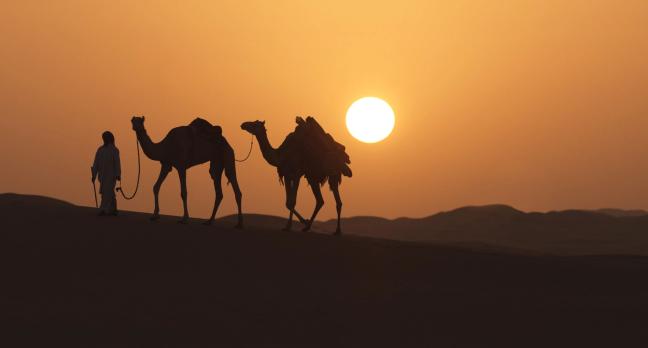
Known as ‘the priceless’ across much of the Middle East, the money poured into the falconry industry may seem absurd. But much of it – the $130 for a falcon passport included – is spent to counter the black market of falcon smuggling. From the Russian Mafia to the Mongolian government, the illegal trading and transportation of these prized birds is rife, spans much of the northern hemisphere, and is second only to weapons smuggling in the most active black markets across the Gulf.
A 2010 investigation found that several Scandinavian countries had even negotiated discounted oil from Saudi Arabia in return for a number of their sought-after gyrfalcons. And it doesn’t end there. The illegal falcon trade can be directly linked to corruption against military leaders, political murder and even international terrorism. These birds are serious business – and worth more in weight across the Middle East than heroin.
As such, falcons are trapped, drugged, wrapped in cloth and smuggled over borders – many crammed into suitcases or swaddled and stuffed into mailing tubes. Some of the birds even suffocate in transit. In Pakistan, there is an airfield which, until recently, was used solely for falcon smuggling. And, several years ago, a man was arrested at Birmingham airport with 14 rare falcon eggs strapped to his body – eggs destined for the Middle East.
But, hailing from cooler climates, the birds are not accustomed to heat – and can only live in the desert during winter months. Instead, the fast-growing cities of the Middle East have become the falcons’ de facto homes. Perched in air-conditioned souqs or aviaries, these status symbols are even used as pigeon pest control by the cities rich enough to afford such extravagances.
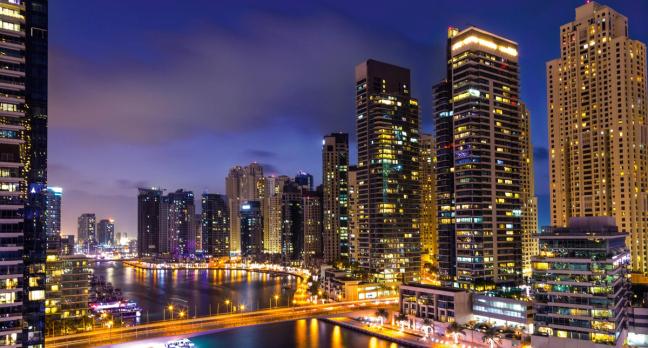
Which takes me to Dubai. Following the feathered trail from the deep desert to the most rapidly-growing, and famously flashy city in the Middle-East, I take a Range Rover down the pristine 12-lane highways towards the city – and falcons follow me the entire way. They are emblazoned on road signs, as well as the notes handed over at toll booths and gas stations. Even the cars themselves cater for falcons.
The Range Rover I’m in admittedly isn’t equipped for falconry, but similar high-end SUVs are commonly modified by Sheikhs and millionaires to more comfortably transport their birds. Last year, Bentley’s bespoke team, Mulliner, launched the Bentayga Falconry, a car boasting a perch between the two front seats, GPS bird-tracking unit and handcrafted falcon-themed inlays – not to mention a price tag of $260,000. But it’s only the best for these birds.
However, for all the expensive cars, Dubai is not what you may expect. Look past the bold shining spires and sprawling mall complexes, and this is a city not only of high-flying business, but one increasingly occupied with the preservation of its heritage and traditional practices. Accordingly, these birds are top of the bill, with Falcon Tower, Falcon Roundabout and Falcon Road all taking pride of place across the metropolis.
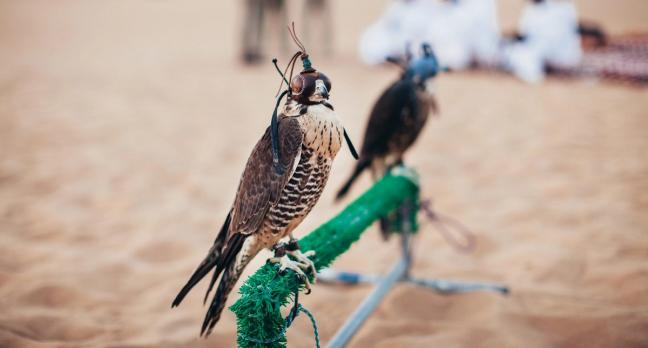
In 2015, falcons were brought in to tackle Dubai’s rising pigeon population. But, as raptor expert and pest control specialist Steph Green tells me when I meet her at local falcon centre Wildflight – which offers an Interactive Falconry Experience – there are myriad problems associated with letting these predators loose in the city. ‘The heat, for one,’ she says over the hum of an air conditioner. ‘And that’s just one of the issues we’ve faced out here during the last decade.
‘Bird flu hit a couple of years ago,’ recalls Green, ‘and I was working elsewhere in the Middle East at the time. We had to put a lot of birds down, and many people – who had paid a lot of money for their birds – kicked up a fuss. But it had to be done.
These birds are serious business – and worth more in weight across the Middle East than heroin
‘The economy also took a hit, of course, back in 2008,’ she continues. The majority of cities out here, and the falcon industry, have recovered, yet there are still problems. But places like the Falcon Heritage Souq, which opened almost ten years ago and is the only legitimate place in Dubai to buy a falcon, have given a boost to the industry.
Heading downtown, past the iconic Palm Jumeirah islands where I’m staying (rooms at the JA Palm Tree Court start from £133 including taxes and service, per room per night) and the towering Burj Khalifa, I pay a visit to this souq. Dedicated to the purchase and training of falcons, this is a place that shows the utmost seriousness with which the practice is taken. There are centres for research into falcon reproduction, men who will sketch your falcon, and shops selling tub upon tub of falcon-friendly supplements. $30 for some falcon ‘power powder’? You’d be bird-brained not to.
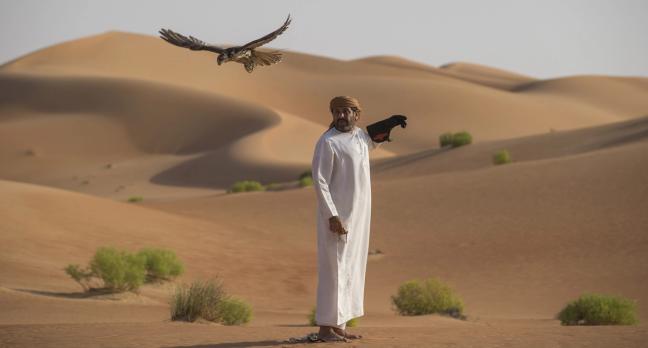
Hadef Al-Jarwan is threading leather string through falcon hoods in his shop. A fan whirs overhead and a dozen or so falcons are standing serene and hooded in the corner on old newspapers. Outside, yet more birds stand in regimented rows on raised, astro-turf wrapped poles. ‘Gyrfalcons are best,’ Hadef nods in broken English. ‘They have light feathers, and many people want them. But Saker falcons are worth the most – not very common here, but up to $4 million on the black market. Our birds don’t cost that much – but can be up to $8,000.’
Hadef has been selling falcons for over a decade, and tells me that although the economic crash saw a fall in bird buying, falconry is on the rise once more. ‘We care about traditions again. It may look new,’ he waves dismissively towards a rack of brightly-coloured airplanes and drones, ‘but it’s about our past. We’ve got so many modern things – cars and buildings and technology – that falconry is important. It’s important to remember who we were before we had money.’
In essence, that explains the Middle East’s rekindled love for these birds. Wealth and resources may have increased tenfold over the past half-century, but in a bid to stop heritage and national identity slipping through their fingers, this proud people have made it so falconry still rules the roost.
For more information about travelling to Dubai, click here. Emirates operates 126 non-stop flights per week from the UK to Dubai, and JA Palm Tree Court is available to book rooms now.
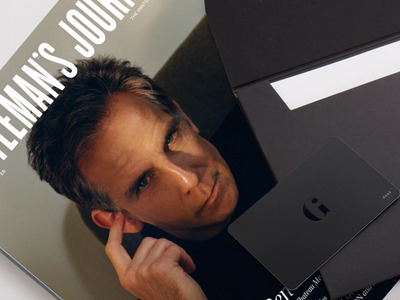
Become a Gentleman’s Journal Member?
Like the Gentleman’s Journal? Why not join the Clubhouse, a special kind of private club where members receive offers and experiences from hand-picked, premium brands. You will also receive invites to exclusive events, the quarterly print magazine delivered directly to your door and your own membership card.
